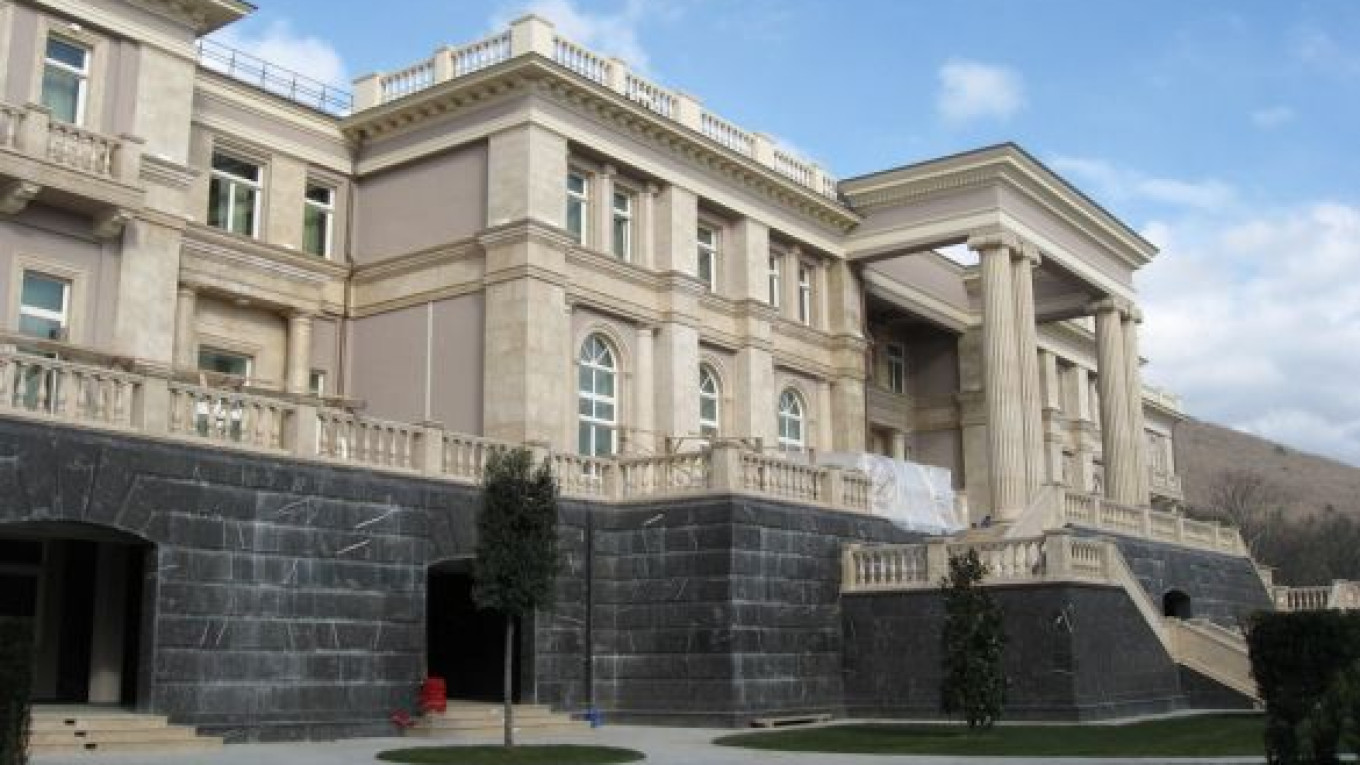New documents confirm that the Kremlin property chief approved construction of a posh seaside palace rumored to be a residence for Prime Minister Vladimir Putin, despite his explicit denial of any link to the project, a newspaper said.
Vladimir Kozhin, chief of the Office for Presidential Affairs, said last week that his agency is not involved with the construction of a mansion in the Krasnodar region that whistleblowers linked to Putin.
But Kozhin had his deputy authorize the construction, and even personally signed relevant papers, copies of which were made public by Novaya Gazeta on Friday.
The first reports about "Putin's Palace," allegedly worth $1 billion, appeared in December, when St. Petersburg-based businessman Sergei Kolesnikov complained about the project in an open letter to President Dmitry Medvedev.
An investment contract released by the newspaper lists the Office for Presidential Affairs and a company called Lirus as parties involved in the construction of a resort complex occupying some 740,000 square meters in the Krasnodar region city of Gelendzhik.
Lirus was to invest 400 million rubles ($13 million) in the project, scheduled for completion in 2008, and was to own 70 percent of the developed area, with the rest going to the Office for Presidential Affairs.
The document is dated 2005 — when Putin was the president — and was signed by Kozhin's deputy, Sergei Kovalyov. A supplement to the contract, also available on the newspaper's web site, lists the Federal Guard Service as developer and is signed by Kozhin.
Kolesnikov told Novaya Gazeta that Lirus, a subsidiary of Rosinvest, was established in 2005 "on the order of Putin" by Nikolai Shamalov, a long-time friend of the prime minister.
Another company mentioned in the leaked documents, Indokopas, belongs to a firm called Rirus and is co-owned by Shamalov, according to Spark Interfax business database. Rirus and Lirus have the same St. Petersburg address in the database.
A spokesman for the Office for Presidential Affairs, Viktor Khrekov, declined to comment Monday, saying that Kozhin has "spoken exhaustingly on the matter," RIA-Novosti reported.
The Black Sea project "has nothing to do with our office or the head of the government. We never did any construction there and aren't planning any," Kozhin was quoted as saying earlier.
Putin's spokesman Dmitry Peskov has also denied reports about Putin's link to the project.
A set of photos of the alleged palace was published last month by RuLeaks.org, a Russian offshoot of WikiLeaks. More photos were released by the Environment Watch North Caucasus group, members of which visited the site on Saturday.
The photographs, available at the group's web site, show a cream-colored two-story building in a classical style, with walkways and a neat formal garden. The Russian coat of arms, a gold-plated double-headed eagle, is installed above the main gates.
Activists, who were accompanied by Sobesednik magazine reporter Rimma Akhmetova, were briefly detained by officers of the Federal Guard Service while taking pictures of the mansion, group member Dmitry Shevchenko told The Moscow Times on Sunday.
Environment Watch North Caucasus is investigating the palace because it is being built illegally on protected forestland, Shevchenko said.
The site was patrolled by private security guards, who called police and Federal Guard Service officers after encountering the activists, he said.
"At first they behaved correctly, but blocked our way when we wanted to leave the place," Shevchenko said.
But then a private security guard forcibly took away a modem one of the activists attempted to use to send photos he took, he said.
The group's personal belongings were also confiscated, and neither the belongings nor the gadget were returned despite their protests, the activist added.
No officials commented on the story Monday.
"We will continue our efforts to raise public awareness of the situation," Shevchenko said. "This is the only thing we can do."
A Message from The Moscow Times:
Dear readers,
We are facing unprecedented challenges. Russia's Prosecutor General's Office has designated The Moscow Times as an "undesirable" organization, criminalizing our work and putting our staff at risk of prosecution. This follows our earlier unjust labeling as a "foreign agent."
These actions are direct attempts to silence independent journalism in Russia. The authorities claim our work "discredits the decisions of the Russian leadership." We see things differently: we strive to provide accurate, unbiased reporting on Russia.
We, the journalists of The Moscow Times, refuse to be silenced. But to continue our work, we need your help.
Your support, no matter how small, makes a world of difference. If you can, please support us monthly starting from just $2. It's quick to set up, and every contribution makes a significant impact.
By supporting The Moscow Times, you're defending open, independent journalism in the face of repression. Thank you for standing with us.
Remind me later.


